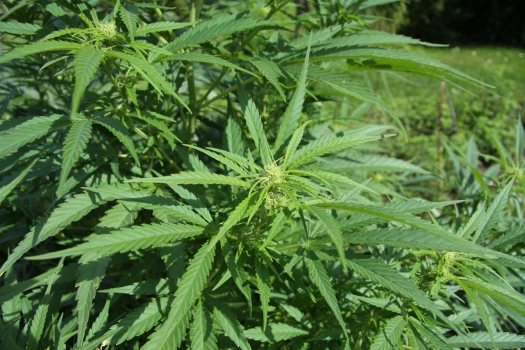The body naturally has an endocannabinoid system which produces cannabinoids naturally in the body. The two main innate cannabinoids are anandamide and 2-AG with receptor sites in the brain and in the gut. We make our own cannabinoids during various activities like meditating, breast feeding, or the runners high that joggers experience. When our natural endocannabinoid system is not operating normally there are symptoms which can culminate in many of the health issues listed below.
One way to bring balance to our endocannabinoid system is to supplement with plant cannabinoids found in Cannabis salvia plants including hemp and marijuana. There are many cannabinoids found in these plants with the two main ones being CBD (cannabidiol) and THC (tetrahydrocannabinol).
In hemp the CBD is more prominent and in marijuana the THC typically is more prominent. However, marijuana plants are now being cultivated to be higher in CBD as a medicinal option. In addition to the cannabinoids found in cannabis, there are terpenes, flavonoids and waxes that synergistic when the whole plant is used. CBD or CBD as a whole plant balances this endocannabinoid system bringing back health to the body.
THC has psychoactive components making one feel high and euphoric. THC and CBD both have healing benefits but in many cases the patient wants to avoid the psychotropic effects of THC. Thus the emphasis is often on CBD.
Research is showing that CBD offers more medical applications than THC. There are a tremendous number of conditions that research shows are helped with CBD. A quick search on PubMed will bring up studies confirming this. Conditions that were studied with favorable results include:
- Acne
- ADD and ADHD
- Addiction
- AIDS
- ALS
- Alzheimer’s disease
- Anorexia
- Antibiotic resistance
- Anxiety
- Atherosclerosis
- Arthritis
- Asthma
- Autism
- Bipolar disorder
- Cancer
- Colitis and Crohn’s
- Depression
- Diabetes
- Endocrine disorders
- Epilepsy and Seizures
- Fibromyalgia
- Glaucoma
- Heart disease
- Huntington’s disease
- Inflammation
- Irritable Bowel Syndrome
- Kidney disease
- Liver disease
- Mad Cow disease
- Metabolic syndrome
- Migraine
- Mood disorders
- Motion sickness
- MS
- Nausea
- Neurodegeneration
- Neuropathic pain
- Obesity
- OCD
- Osteoporosis
- Parkinson’s disease
- PTSD
- Rheumatism
- Schizophrenia
- Sickle Cell Anemia
- Skin conditions
- Sleep disorders
- Spinal Cord Injury
- Stress
- Stroke and TBI
It is apparent the applications for CBD are numerous and broad scoped. One area of investigation by the US government included oxidative associated diseases, such as ischemia (including stroke), inflammation, autoimmune issues, Alzheimer’s disease, Parkinson’s, and other age related diseases. This research found that CBD was neuroprotective.
One of the more famous cases that brought CBD into the lime light was Charlotte Figi. She suffered from a rare form of epilepsy. After five years of trying every treatment doctors could think of, her condition continued to deteriorate. Her father found research that marijuana had helped other cases. They needed a strain of marijuana that was high in CBD and low in THC. This was no easy task but they finally found a source in Colorado. Charlotte’s condition improved immediately. She went from 300 seizures a week to not having any seizures in the first week of treatment. It was remarkable and life-saving for Charlotte.
In 2013 Dr. Sanjay Gupta produced a documentary for CNN called Weed. This documentary has three parts and is listed by title (Weed) in the Videos section of the FAIM website. It is a two hour piece that gives the history of hemp and marijuana and insightful information on the pros and cons of both. Dr. Gupta has now produced Weed 4 which explains how cannabinoids can help people with opioid addiction.
CBD has a physiological impact on the body by upregulating the genes that help calm inflammation and down regulating the genes that promote inflammation. CBD causes a balancing cascade throughout the central nervous system, immune system, nervous system, cardiovascular system and lymphatic system. CBD when taken as a nutritional supplement, participates in this endocannabinoid system bringing balance to the body.
CBDs help the body counteract the insult from toxins we experience daily from chemicals, bacteria, fungus, viruses and endotoxins in the gut. Inflammation from these toxins cause a large variety of diseases as well as inflammatory conditions in the central nervous system affecting the brain. This is why CBD has such great success in treating so many diseases.
There are many companies that are producing and marketing CBD so it is important to determine the quality prior to purchasing. Growers in the United States are regulated and appear to produce a much higher quality product than CBD that is imported from other countries. If you decide CBD could be helpful for your health, research the company carefully to insure you are getting a high quality CBD. All reputable companies should do lab testing on their products and it is the consumer’s right to request these test results.
For more information you can go to United Patients Group. This is a tremendous resource and trusted leader in Medical Cannabis for physicians, patients and organizations helping navigate through the ever-changing industry. In addition, there are a great number of videos available on the internet.



